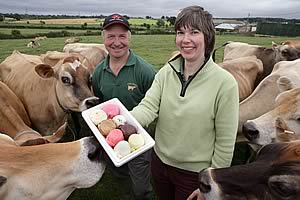 |
|||||||||
|
|||||||||||||||||||
Gold Cup finalist 2005, Steven and Claire Bland
Grit and determination - and a good head for business - have taken Cumbrian dairy farmer Steven Bland into the final round of the industry's most prestigious award - the NMR/RABDF Gold Cup. Steven and his wife Claire have come a long way since 2001, when their Holstein herd was culled due to foot-and-mouth disease. They restocked in 2002 and today their hard work and business acumen sees their 140-strong pedigree Jersey herd, based at Abbott Lodge, near Clifton, Penrith, take a well-earned place in the final six herds from all over Britain that are vying to win this year's coveted award. Their 93-hectare unit fits in well with the philosophy of the competition that spotlights farm management, environment policies and future planning strategies, as well as investigating the production, health and welfare status of the herd. The herd averaged 6,362kg of milk, at 5.43pc butterfat and 3.84pc protein, with a somatic cell count of 157,000 cells/ml, in 2004. Around 90pc of the milk from the herd is sold via First Milk to Longley Farms, with the remainder being processed on farm into Abbott Lodge Jersey ice-cream. This is sold in the farm's tearoom - another new addition to the unit. “Having no stock on the farm for a few months gave us a new insight - we saw the unit in a completely different way,” says Steven. “Prior to the cull, Claire and I had discussed what we might do if we lost our herd, and the idea of restocking with Jerseys seemed ideal - they were certainly better suited to our small cubicles,” he adds. They also realised, as they watched the trucks arrive to load up their culled herd, that there was a lot of traffic passing their farm entrance, on it's way to the local garden centre and pottery. “And we had an old circular 'gin case' - ideal for converting into a tearoom - and two entrances to the farm, so we were set up just right to open our doors to the public,” adds Steven. So just nine-months after their Holstein herd was culled, the pair restocked, started on-farm processing and retailing, and built a children's play area as an extra attraction for passing trade. And they didn't stop there. Steven has also found time to manage the farm's environment and is in the process of entering the unit into the Entry Level Scheme. “And I think we could possibly get onto the Higher Level Scheme as we sow mostly spring cereals and the grey partridge do very well here,” says Steven. Hedge laying has also kept Steven busy. He says that when they took on the farm the hedgerows were in a bit of a state, but his efforts have seen the unit join the Countryside Stewardship Scheme. It's hard to imagine that he has time for anything else, but Steven is also very keen on genetics and showing cattle. The herd is predominantly US Jerseys and Steven favours American genetics. “The cattle work for me. The American bloodlines produce the type of cow that I require - a commercial cow that lasts a long time in the herd.” That said, he also like to take a turn in the show ring and has had considerable success already this year, taking the titles of Champion Jersey and Reserve Supreme Dairy Champion at the Penrith Show. “I love cows, I love showing and I'd like to have the time to do more in the future. I also do some judging myself whenever I get the chance.” Looking forward is what Steven says he does best and he says he hopes to have semi-retired in 10 year's time. “I'd like my son Robert to be keen to take on the business, but I'm hoping to send him away to college and to work first. Then I hope he'll come back and harass me to death about taking on the farm - he's got to want to do it if the business is going to be a success. “I'll be in my 50s by then and ideally I don't want to still be milking cows. I'd like to keep an active role in managing the business, but with a little less of the hard slog!” The NMR/RABDF Gold Cup is open to all milk recorded herds meeting the competition criteria of more than 50 cows, a rolling average cell count of less than 200,000/ml and a PIN of +£20. Finalists in the NMR/RABDF Gold Cup 2005 will be judged by a panel including Andrew Chadwick, RABDF Council member, dairy farmer from Cheshire Tim Dobson, NMR Chairman and dairy farmer from the West Midlands Philip Kirkham, and independent environmental consultant Richard Knight. The winner will be announced at the Dairy Event on September 21 at Stoneleigh. |
|||||||||||||||||||

|
|
||||||||||||||||||
| home | agri-services | pedigree
pen | news | dairy | beef | machinery bps | property | organisations | site map |
|||||||||||||||||||

